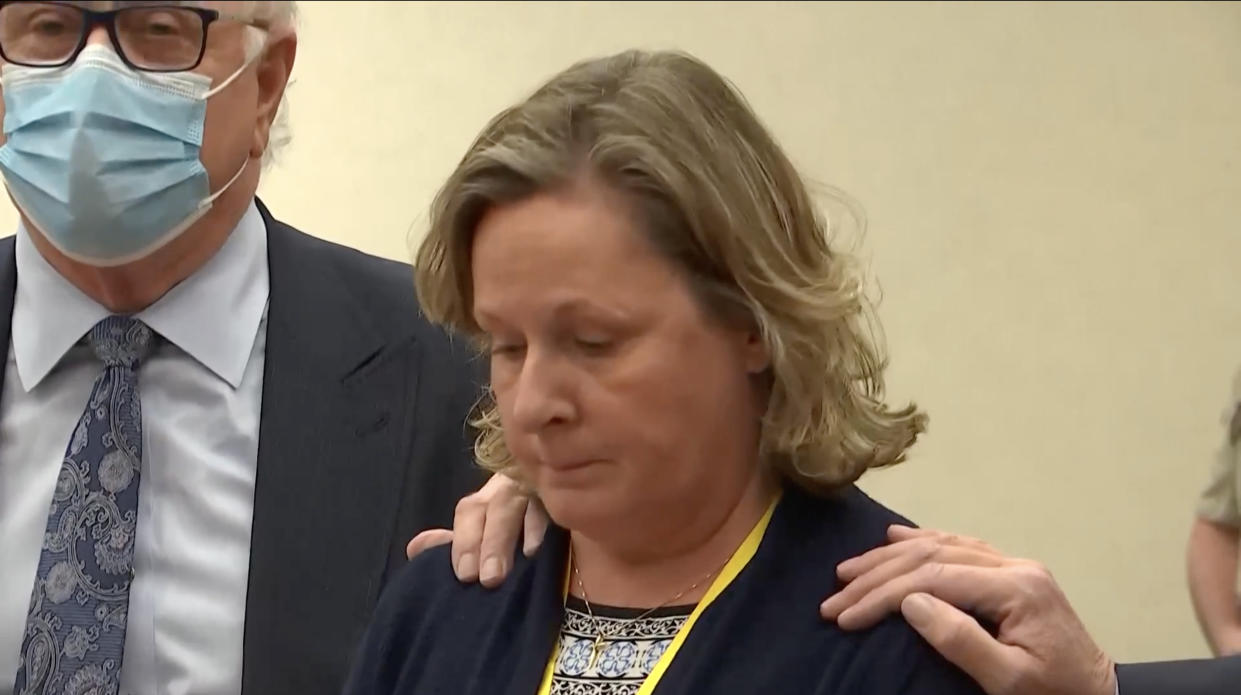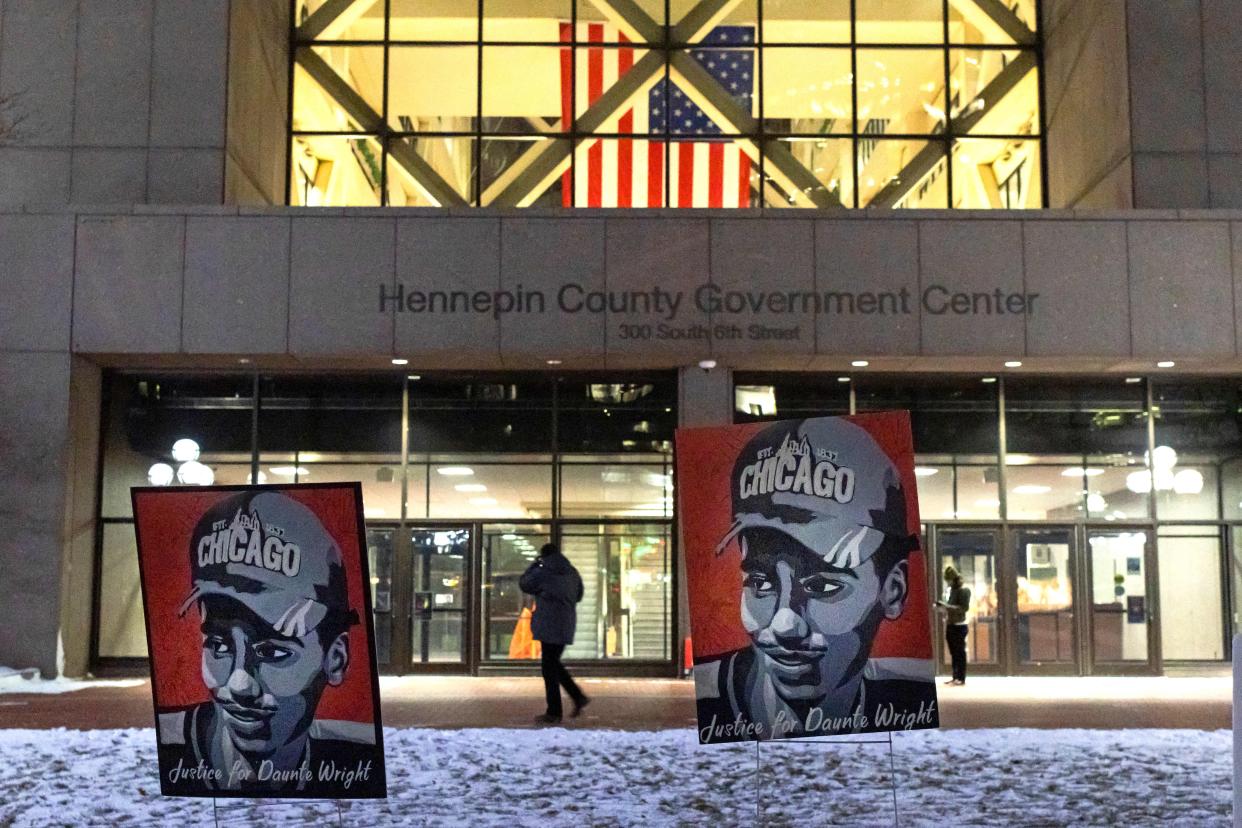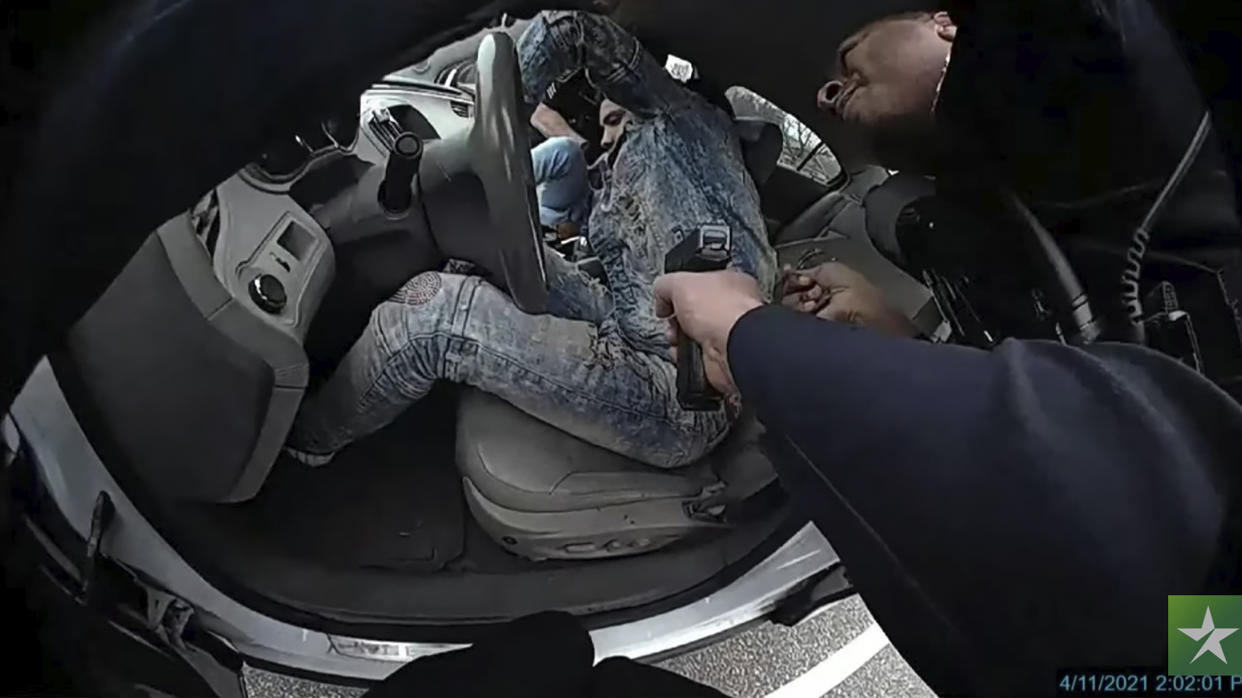Jury finds Kim Potter guilty in Daunte Wright traffic stop shooting
A jury has found former Brooklyn Center, Minn., Police Officer Kim Potter guilty of manslaughter in the death of Black motorist Daunte Wright, following a two-week trial and 27 hours of deliberation by the 12 jurors.
Potter fatally shot Wright, 20, after she and an officer trainee pulled him over in the Minneapolis suburb on April 11. They, along with a third officer, attempted to arrest him when he tried to take off with his girlfriend in the car.
Potter’s bodycam footage shows her threatening to use her Taser multiple times during the struggle to remove him from the car. She then fired off a shot but grabbed her gun instead of the Taser. In the video, Potter exclaims: “I grabbed the wrong f***ing gun.”
She was found guilty on a charge of first-degree manslaughter, which carries a maximum sentence of 15 years in prison and a $30,000 fine, according to Minnesota law, and also a second-degree charge, for causing someone’s death through culpable negligence, which has a maximum sentence of 10 years and a $20,000 fine.

At one point, the jury appeared to be deadlocked or at least struggling in making a decision. Tuesday night, the panel sent a question to Judge Regina Chu, asking, “If the jury cannot reach consensus what is the guidance around how long and what steps should be taken?”
Chu reread a portion of the jury instructions she had given them before. “You should discuss the case with one another and deliberate with a view toward reaching agreement, if you can do so without violating your individual judgment,” she said, in part.
For a conviction, the state had to prove beyond a reasonable doubt that Potter handled her firearm “recklessly” and showed culpable negligence in her actions that resulted in Wright’s death.
Prosecutors focused on Potter’s training and that she should have known the difference in weight and feel of the weapons. She carried a gun on her duty belt her entire 26-year career and a Taser since 2005, according to court testimony. Potter retrained for use of both each year she was equipped with them, prosecutors said, adding there was no excuse for “weapons confusion.”
“Members of the jury, the defendant told you her sons will be home for the holidays. You know who won’t be home for the holidays ... is Daunte Wright,” said prosecuting attorney Erin Eldridge during closing arguments.

“What this case is really about is about an officer who mishandled her firearm,” Eldridge went on to say. “That’s why we’re here and even if you take the defendant’s word for it — she admits — that’s what she did. She told you in court she knew it was wrong and she knew from the very beginning.”
When Potter testified last week, she broke down while giving her account of what happened, saying, “We were trying to keep him from driving away, it just went chaotic and then I remember yelling ‘Taser, Taser, Taser’ and nothing happened and then he [Wright] told me I shot him.”
Potter’s defense team argued that Potter had the right to use not only her Taser but also her gun, had she intended to, because of the danger her fellow officers faced.
“Did they prove beyond a reasonable doubt that she caused this death? No. Daunte Wright caused his own death, unfortunately," Earl Gray, her defense attorney, said during his closing arguments.
Gray added that the two other officers involved in the incident, Officer Anthony Luckey and then-Sgt. Mychal Johnson, believed Potter was justified based on comments made that day and in court. He walked the jury through a vantage point of what happened when officers told Wright to get out of the car.
“[Wright] hesitated and he said, ‘Why?’ And then he got out of the car and Officer Luckey, being a nice guy, he could have taken him and thrown him against the car and put his knee on his neck. No, he said, ‘Put your hands behind your back, I’m going to handcuff you.’”
“Knee on his neck” is a reference to the killing of George Floyd by former Minneapolis Police Officer Derek Chauvin.
Gray continued: “Within seconds, he all of a sudden breaks away. That’s the cause, ladies and gentlemen of the jury. That’s what caused this whole incident. If he would’ve gone with the officers, been handcuffed, go to the squad car, go take a ride downtown and it’s over.”

Eldridge argued that Potter was responsible.
“The defendant alone is responsible for her choices and her actions. Daunte Wright did not cause his own death. We’re here because this was entirely preventable. It didn’t have to happen. It was a tragedy of her own making and it’s not just a tragedy, it’s manslaughter,” she said. “Her actions were rash and reckless and what she did was wrong.”
Benjamin Crump, a prominent civil rights attorney, described Wright’s family as “very emotional, anxious, just very much,” in an interview with Yahoo News on Tuesday.
He serves as co-counsel for the family and drew parallels between this case and that of Mohamed Noor, a Black former Minneapolis police officer who was found guilty in the shooting death of a white female in 2019.
“Now in the case of Officer Noor, he said, No. 1, ‘I’m sorry. I didn’t mean it. It was a mistake.’ He cried. He was remorseful. No. 2, he said, ‘The reason I did what I did was because I was trying to protect my fellow officer. I was worried about his safety. I didn’t want him to get killed,’” Crump said, adding that the same court in Hennepin County decided Noor violated police department policies in his actions.
“They convicted him and sentenced him for 12 years for killing an unarmed white woman, in what many believe a far worse situation than Kim Potter because it was pitch dark. They couldn’t see what she was reaching for. And then you look at what happened to him, so you say, ‘Well, if it did not work for him, why should [Potter] escape culpability?’ We can’t have two different systems of justice in America.”
He added: “And all we’re saying is we want equal justice for Daunte Wright. Don’t change your rules when it’s one of our children lying dead on the ground.”
The jury was made up of nine white people, two Asian Americans and one Black person, according to how the jurors self-identified to the court. Six were men and six were women, and they ranged in age from their 20s to their 60s.
Judge Chu said sentencing will take place on Feb. 18, 2022, at 9 a.m. Until then, Potter will be in custody and held without bail.
